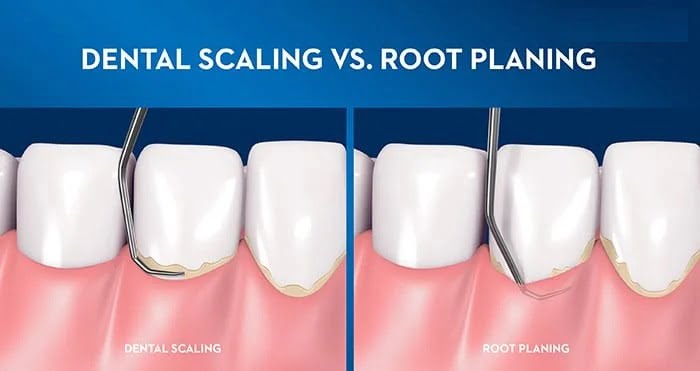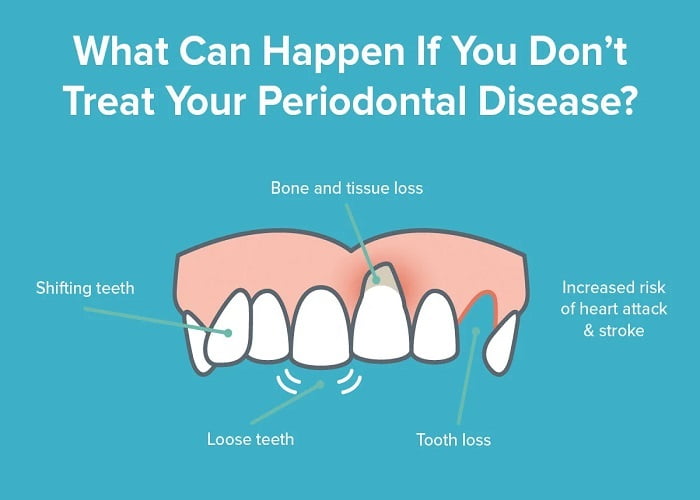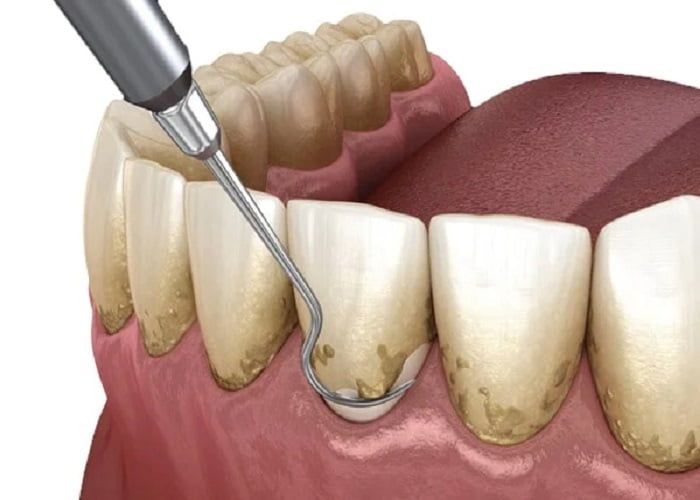Dental deep cleaning, also known as scaling and root planing, involves special techniques to get rid of plaque, tartar, and bacteria below the gum line down to your tooth roots. This prevents gum disease from advancing and causing tooth loss.
What Is Scaling and Root Planing (Deep Cleaning) of Teeth?
Scaling and root planing (deep cleaning) is different from a regular dental cleaning. This type of procedure goes below the gum line. It does this to clean hard-to-reach spots like the roots and pockets at the base of your tooth. A substance known as tartar can build-up around the exterior and roots of teeth. If left unchecked, then this tartar can cause serious bacterial infections, periodontal (gum) disease, and bone loss.
As such, dentists use a technique known as periodontal scaling and root planing to remove this substance. If the tartar can’t be removed using manual scraping, then they’ll also use an ultrasonic removal device. The process of removing tartar can sometimes be quite demanding.
See more: Root Canal Treatment in Marrysville Ohio

How long does it take?
Scaling and root planing can last hours and might need to be broken up into multiple appointments. Ultimately, it depends on how bad the case is and how sensitive your teeth are. While a deep cleaning might sound tedious, it’s a vital part of fighting against dangerous oral infections. If left untreated it can warp into an even worse condition, like bone loss, which will lead to tooth loss in the future. So how do you know when a deep cleaning is needed?
When is Deep Cleaning Necessary?
The ADA recommends scheduling dental appointments for intervals recommended by the dentist. There’s no one set answer for how often you should get a deep cleaning. That’s because every unique case requires a different approach. During these visits, your dentist will recommend whether or not you should get a deep cleaning.
One clear sign of needing deep cleaning is checking for periodontal (gum) disease. You can do this by measuring how far your gums pull away from your teeth. Any pocket that’s more than 5mm deep will require immediate deep cleaning. Other symptoms of gum disease include things like:
- Swelling gums
- Bleeding gums
- Bruising around the gums
- Pus in the gums
- Bad smelling breath
Periodontal (gum) disease occurs when bacteria get into pockets and roots of the teeth. Certain types of periodontal (gum) diseases will also require additional treatments. It’s also recommended to get a deep cleaning if it’s been more than a year since your appointment with your dental hygienist.
See more: The disadvantages of deep cleaning teeth your teeth weekly

How Does Scaling and Root Planing Work?
Before the procedure, your dentist will go over your medical history and take radiographs. That way, they have a good idea of which areas to focus on. After this preliminary planning stage, the dentist will measure the depths of the gum pockets using a special tool, called periodontal probe.
This process is also used for probing to determine if the person has gingivitis or periodontitis:
Gingivitis and periodontitis are two common periodontal (gum) diseases. Both involve inflammation of the gums, but gingivitis is less serious and can be reversed with good oral hygiene. Periodontitis is more severe, and can lead to tooth loss if not treated.
After this, the dentist will begin the scaling process. As we mentioned earlier, this is as craping that removes tartar from the teeth. If needed, an ultrasonic tool is also used. After this, the teeth are polished using a gritty toothpaste.
Then, an air polisher is applied to smooth out the teeth. The dentists may go through final flossing as well. Finally, a fluoride treatment might be used. This process helps remineralize the enamel on your teeth.
Read more: How much does a dental cleaning cost?

Does Scaling and Root Planing Hurt?
Most of the time, any discomfort associated with the procedure is bearable. However, individuals with particularly deep pockets will be in a lot more pain or discomfort than others. Similarly, people with sensitive teeth might be incredibly uncomfortable. As such, a dentist will administer a local anesthetic as it’s needed. This will just numb the area around your gum.
Some patients may experience some discomfort or soreness for a few days after SRP, but this can usually be managed with over-the-counter pain medications.
How Much Does Scaling and Root Planing Cost?
The cost of deep teeth cleaning can vary depending on the severity of the case. More gum disease and inflammation will require more work to fully clean. As such, it will be more expensive. You’ll likely have two separate visits, or more if the damage is extensive.
Typically, dentists charge for each quadrant of the mouth that’s deep cleaned. The average cost is usually $100+ per quadrant. But this can change depending on where you live. If you have dental insurance, then you should check your plan. Many insurance providers cover deep cleanings.
What to Expect After Scaling and Root Planing
Typically after the deep cleaning, you’ll experience slight soreness of the gums. As such, you should avoid hot, crunchy, hard, acidic, and sticky foods. We also recommend brushing with toothpaste for sensitive teeth.
You might notice some bleeding when you first start brushing, but this shouldn’t last long. If you can help it, try to avoid brushing the affected area. Also, you should wait one week to floss so you don’t agitate the gums. If you notice swelling, then try washing with a saltwater solution.

If you need to replace a tooth or need support in maintaining good oral health, contact Dentist in Marysville for advice and support. With years of experience and professionalism, the experts at Dentist For life will help you have a bright smile and the best oral health.



